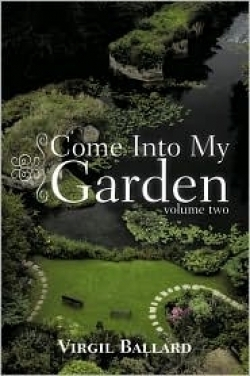Come Into My Garden
Volume Two
Virgil Ballard’s Come Into My Garden: Volume Two contains nearly two hundred poems composed of cute rhymed stanzas that cover everything from macaroni to thwarted love. The tone runs towards the sentimental, even edging into Hallmark territory. This collection will appeal to those with little experience in reading poetry, and little interest in learning about anything but Ballard’s personal adventures with love.
Our illicit love is strong, yet so long hidden/Shouting “I love Ruth“, is of course forbidden. This seems to be the main thread of Ballard’s work. He reiterates the inspiration for his poetry: when he was 15, his courtship of a younger girl named Ruth was interrupted by Ruth’s grandmother, who severed communications between the lovers. Both Ruth and Ballard moved on, married other people, and raised families—then met and reunited after their partners had passed away. Ballard’s unfiltered speculation on “Ruth: The Missing Years,” tends towards the bitter. Time lost, years wasted (raising a large family with another woman not considered) is one of Ballard’s themes—mixed with reminiscence on the sweetness of young Ruth, and the changes she’d been through when he met her sixty years later. It’s material that has the potential to be deeply poignant, a rekindling of love later in life with someone who had been given up to memory. Instead, Ballard runs his rhymes into the ground. For example, in “King and Queen,” Ballard lingers for a moment to run my fingers through those graying strands/And cup that dear face in my warm hands. That’s lovely. But four lines later, my hand lightly touches her firm tits, and the sweet moment is lost. Perhaps this kind of petting is appealing to the author, but it is so personal an experience that it means nothing to the reader—and one wonders what the subject, Ruth, thinks of having these poems shared with the world.
Granted, the genre of love poetry is wide—it encompasses the profane along with the sacred, the prude and the provocative. But what successful poetry does is hint at the world beyond the poem. Dante does not only love Beatrice in his Inferno. He also shares his comprehension of what love means, in the universal sense—the fires that live under every human skin, the same sensations described by Shakespeare in his sonnets, and Elizabeth Barrett Brown in hers. Great poems talk about the things we share; they are not personal biographies, nor do they exploit the details of the past. Ballard might do well to take a page out of more well-seasoned collections—his poetry has the potential to be really good, if he would look outside his own experience and consider how his love of Ruth relates to all the love that has ever existed. Because despite the personal nature of romance, it’s something that is shared—something that every reader, knowing love, wishes to comprehend in a new form.
Reviewed by
Claire Rudy Foster
Disclosure: This article is not an endorsement, but a review. The publisher of this book provided free copies of the book and paid a small fee to have their book reviewed by a professional reviewer. Foreword Reviews and Clarion Reviews make no guarantee that the publisher will receive a positive review. Foreword Magazine, Inc. is disclosing this in accordance with the Federal Trade Commission’s 16 CFR, Part 255.

